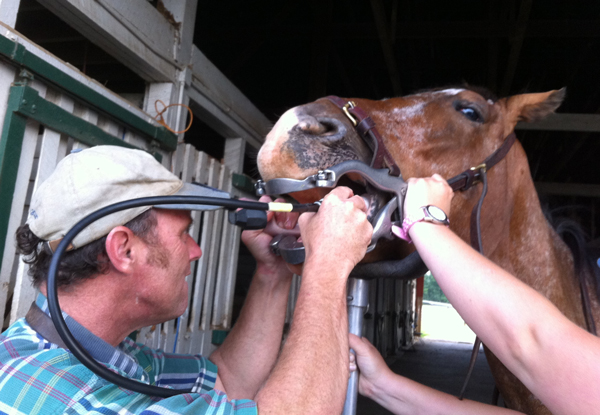Recognizing the Connection Between Dental Pain and Horse Behavior Problems


Could dental pain be the culprit for your horse’s behavioral problems? A recent study done by researchers at the University of Helsinki in Finland that was published in the Journal of Equine Veterinary Science established a link between common horse behavior problems and dental pain caused by abscessed cheek teeth. Periapical infections (those around the apex of the tooth root) or abscessed cheek teeth are common in horses and will usually induce pain that is displayed in your horse’s behavior. According to the research, half of the cases of periapical infections were diagnosed during routine dental examinations, indicating that horse owners were unaware of the association between undesirable behavioral patterns of their horses and dental pain.
Behavior Problems Linked to Tooth Pain
Common behavioral signs associated with cheek teeth abscesses fall into three main categories. Some signs include:
Eating and Drinking:
◆ Eating slowly or taking frequent pauses while eating hay
◆ Turning the head while eating or dropping hay or grain from his mouth
◆ Dipping hay in water or avoiding drinking cold water
Bit-Related:
◆ Evading the bit
◆ Headshaking, lolling tongue or opening his mouth when ridden and/or driven with a bit
◆ Rein contact worse on one side of the mouth
◆ Resistance to bridling
General:
◆ Withdrawn, intense stare, aggressive behavior, or self-harm to his head
◆ Avoiding social interaction with other horses and people
◆ Bad-smelling breath
◆ Poor performance, such as a decline in athletic ability
Zoetis is committed to educating horse owners about the importance of annual dental examinations and care by an equine veterinarian. Behavioral signs caused by dental abnormalities are crucial to identify. Recognizing these potential behavior changes in your horse that may be caused by dental pain can help with earlier diagnosis, treatment and improved health and wellness for your horse.
If your horse is expressing any of these behavioral signs, work with your equine veterinarian to conduct an oral and dental examination. Annual oral and dental examinations are a recommended baseline of care for your horse. Depending on your horse’s age, level of performance and overall condition of the teeth, additional examinations throughout the year may be needed.
For more information, visit www.zoetisus.com.
Recent Posts
2025 FEI Basel World Cup Finals Hands Reins to Fort Worth 2026
As U.S. athletes look back on valuable experience gained at the 2025 FEI World Cup Finals in Switzerland, the next…
How to Clean a Horse’s Sheath
If you’ve never cleaned a horse’s sheath, you probably have questions. First and foremost, is it really necessary? And more…
All Three Equestrian Sports Receive Final Confirmation for the LA 2028 Olympic Games
After a nail-biting two years of speculation about the inclusion of equestrian sports in the next Olympic Games, it was…
ASPCA Right Horse Adoptable Horse of the Week: Xanthus
Welcome to Horse Illustrated’s weekly installment of the Right Horse Adoptable Horse of the Week, offered in partnership with the…
Be Your Horse’s Joint Health Champion
Equine arthritis can affect horses of all disciplines and ages, and early intervention is crucial for maintaining comfort and performance.…
Tamie Smith: Taking It To The Next Level
Mother, grandmother, and winning 5* eventing rider—these three titles don’t typically go together. However, Tamie Smith, 49, is all of…